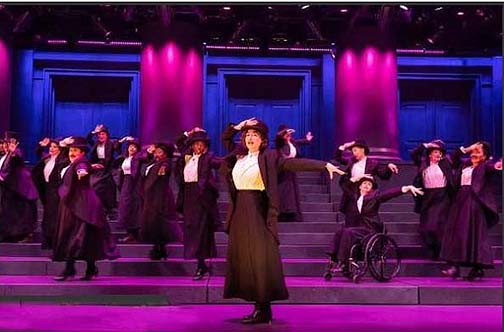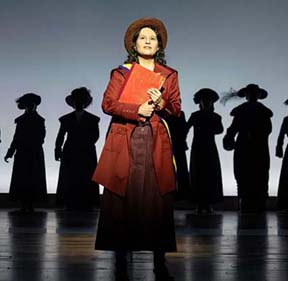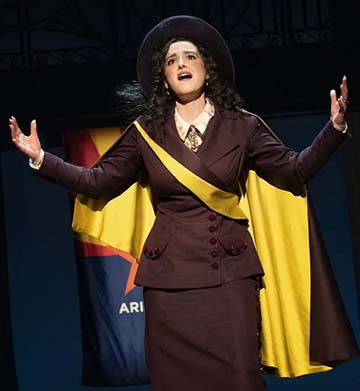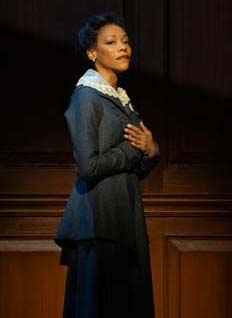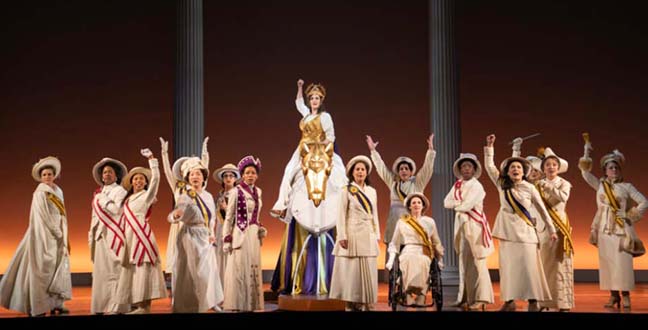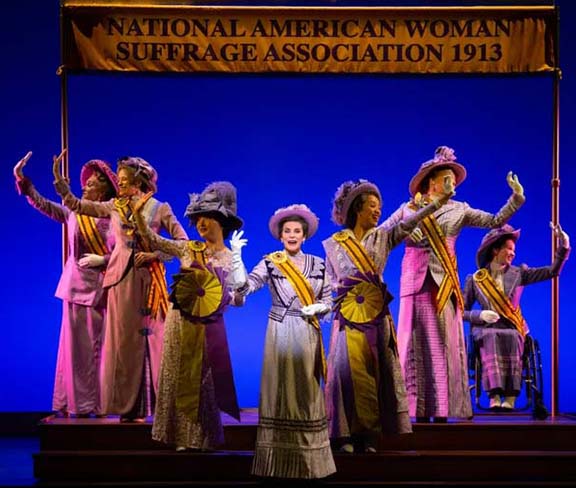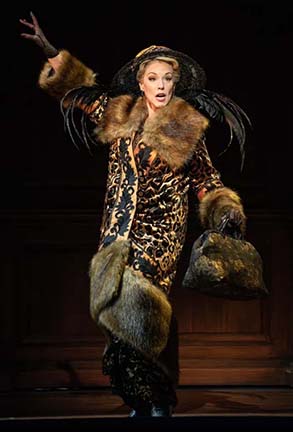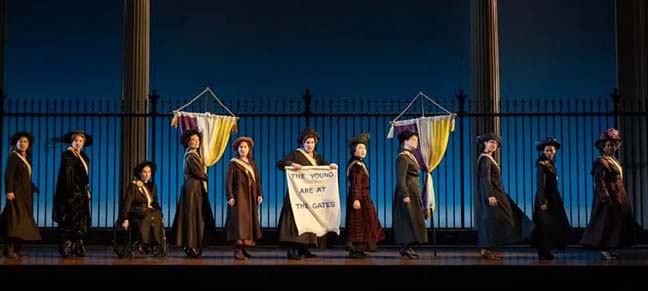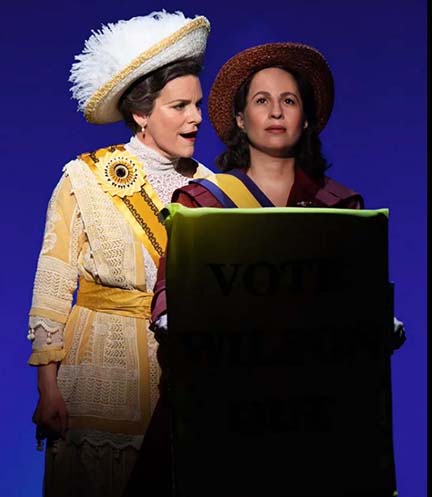By Lucy Komisar
“Suffs” is in the category of the iconic “Les Miz.” A revolutionary story put to music to allow the writer to slip in truths about the forces that oppress a country’s heroes, who are, in this case, heroines. In a country that hasn’t been told the truth. Acclaim to Shaina Taub, who created the book, music and lyrics. It’s now a major part of American musical history.
The suffragists led by Alice Paul, who Taub smartly brings to life, unlike today’s neoliberals knew that radical measures were demanded for the vote to challenge the worthless promises of feckless “leaders.” All the characters are based on real people, and all the roles are played by women.
It opens with the bouncy and satirical “Let Mother Vote,” with the women in men’s clothes, echoing the line of the more conservative feminist, Carrie Chapman Catt.
“Let Mother vote, we raised you after all.
Won’t you thank the lady you have loved since you were small?
Let Mother vote, we’ll keep our country clean.
We’ll tidy up our politics until they are pristine.
Let Mother vote, let Mother vote, we’ll nurse the USA.
Until corruption, greed, and vice are sweetly swept away.” (Fast forward to the future, that didn’t happen!)
But Alice Paul (Shaina Taub) says, “We need a march to force a Constitutional amendment. It becomes the fight between liberals and radicals that persists today.
All her supporters don’t agree. “Let Mother vote, just hold your fury in
Maybe Carrie’s right, and that’s the only way we win
…..Please Alice, have some sense
Don’t you know that no one likes a girl who’s too intense.”
But Paul (Taub) insists in a sweet voice imbued with determination and passion,
“I don’t wanna have to beg for crumbs from a country that doesn’t care what I say
…. There’s millions of women with passion like mine
I wanna shout it out loud In the wide open light
Till our generation has made things right
…
You’ve gotta kick down the doors of the mightiest man
Till they never dare to deny us again
You’ve gotta disrupt their deeds”
The brilliance of Taub, who exudes Alice Paul’s political passion, is that she put the arguments into the lyrics, like “Les Miz.”
There was history that I, a former national vice president of the National Organization for Women, didn’t know, of Inez Milholland (Hannah Cruz). The papers call her glamorous, dazzling. But when the women ask her to be grand marshal of the suffrage march, she says she is busy studying for the bar.
Paul: “It’s on Pennsylvania Avenue, a day before the inauguration. We’ll make every front page with a picture of you leading the pack on horseback.” It was the first protest march in nation’s capital. Paul had a brilliant sense of PR! (Cruz has a wonderful presence and soprano voice.)
But there was a central flaw in the movement, failure to include the cause of black women. Ida B. Wells (Nikki James), the black journalist, sings in a mellifluous Broadway story-telling style,
“Wait my turn, when will you white women ever learn?
I had the same old talk with Carrie Chapman Catt 20 years ago.
I thought you might be better, but you still don’t know.
You want me to wait my turn, to simply put my sex before my race.
Oh, why don’t I leave my skin at home and powder up my face?
….
That’s not leadership, Alice, it’s cowardice.
I hear you quote Frederick Douglass on your soapbox,
Intending to include and impress us.
But in the press, you play down our involvement,
And here behind closed doors, you attempt to suppress us….
I will not wait one more minute for my turn.”
The 1913 march, with Inez in the lead and women carrying banners of yellow and purple that would be their colors, was met with violence. Hooligans jeered and physically attacked them. No police intervened.
And the smarmy Wilson (Grace McLean) in a wonderful vaudeville routine, belts out,
“Ladies, God bless the ladies,
No one adores ladies more than I.
As the father of three daughters,
As the husband to a wife,
I do not know who I’d be without the ladies in my life.
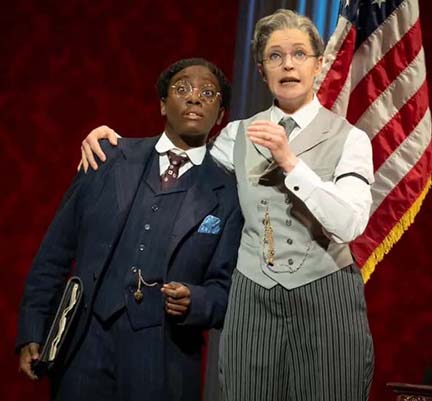
….Ladies must be protected, they rely on us to supervise their lives.
As a leader guards his people, every man must do his share.
We must take care of our ladies.”
The suffragists met him June 5th, 1913, he argued he was busy with tariff reform, April 6th, 1914, the economy. August 8th, 1914, Congress. May 12th, 1915, the Lusitania. June 1st, 1916, tariff reform.
Wilson’s refusal to support women’s suffrage should add to his undeserved “liberal” reputation. He also ordered racial segregation of the federal civil service to limit the access of black civil servants to white-collar positions.
A favorite is the duet between Nadia Dandashi (Doris Stevens) a student from Nebraska, and Tsilala Brock (Dudley Malone), a Wilson aide, in which she educates him about the legal disadvantages of marriage. It’s jazzy and deserves a soft shoe.
“If we were married, I promised to cherish you just as a gentleman should.
If we were married, I promised to forfeit my legal autonomy for good.
If we were married, we’d buy our own acre of land for our own little house.
If we were married, our possessions and property would solely belong to the masculine spouse.
…
If we were married, we’d fill out our family and life would be simply sublime.
If we were married, I’d churn out your children ’cause contraception’s a federal crime.
If we were married, we’d save up a nest egg to cushion us later in life.
If we were married, my earnings would be in your name and I couldn’t control my own spending or open a bank account or sign a contract or hire a lawyer because economically speaking I’d die by becoming your wife.”
Carrie Chapman Catt’s National American Woman Suffrage Association convention faces several challenges. Ida B. Wells raises with Mary Church Terrell, a black women’s organization leader, of her being “a prop” at the event. Terrell counters, “If I didn’t speak, they wouldn’t even mention race.”
And Catt is angry at Paul’s challenge. “She’s undeniably smart but so misguided. I’ve labored for decades to craft a conservative image for suffrage,” She accuses Alice Paul of tearing the movement in two. Chapman Catt kicks her out. But Paul establishes her own campaign center with the help of the radical rich Alva Belmont, who divorced her husband for philandering and walked away with his millions.
Belmont (Emily Skinner) tells Alice Paul: “Let me get this straight.
You gals just stood in front of the suffrage establishment,
And the national press, no less,
And declared political warfare on Wilson and his party,
While the country’s on the brink of war itself.
And now you shamelessly demand my riches of me
For this risky rebel goo.
The nerve of you.
I love it! (followed by loud blasting of horns)
The tragedy is the story of Inez Millholland. She is a brilliant speaker and, Alice Paul presses her to campaign in the west where women could vote in state elections and influence legislative votes on the suffrage amendment. She was anemic, had been ill for years and dies on the campaign trail. She was 30. She is an unsung heroine of the movement, till now.
About the new headquarters, she quips “Some day, you’ll name it after me.” The headquarters of the Women’s Party at 144 Constitution Avenue, NE, Washington, is called the Alva Belmont house. Born in Mobile, Belmont was married to William Vanderbilt, who managed the Vanderbilt family’s railroad investments. And then to Oliver Belmont, a banker who served a term as a U.S. congressman from New York. She died in 1933 in Paris. Sounds like another play!
Far ahead of her time, Paul brought direct action to the White House, with women marching outside and finally chaining themselves to the gates. The 1917 “the Young Are at the Gates” has a “Les Miz” feel. Hundreds came.
“We got nurses from Virginia, college girls from Michigan and Idaho.
And we weren’t all young, you know.
We got workers from the factory, teachers from New York, even Mary Church Terrell came through.”
Then a terrific open letter to the president from Dudley Malone which he published in the Washington Post. Sung with an air of challenge. “Resigning after seven years, he writes, “I think it is high time that men of this generation, at some cost to ourselves, stood up in support of the women of the country.
…
I’d also like to make known my esteem for the woman, For the women who opened my eyes to this inequality.” Resignations for principle are rare.
Paul and three other women are imprisoned for obstruction of traffic. They go on hunger strike.
“Hold it together, see it through.
Don’t let despair get the best of you.
Push down the pain, thicken your skin.
Hold it together, never giving in.”
They are force fed. The doctor lies and says no force is used. But in letters she told the truth:
“I turned and twisted all I could,
But they threw me on my back and strapped in my arms and legs…
They try to pry my mouth open with pliers
And I try to clench my teeth shut,
But they shove the tube down my throat and up my nose.”
Her prison letters are leaked to the press. She is freed.
And she and Cat end up in Tennessee where the legislator is poised to be the final state to ratify the suffrage amendment.
A legislator’s mother (Emily Skinner) writes him, in fine country music accent and sound,
“Now, I know I’m just an old farmer, milking cows in Tennessee,
But I read the paper and I’ve seen the women marching to be free.
They made me think that maybe I could hop a train to Washington DC and march too.
Only I was home raising you, so I did my best to teach you what I knew.
Now your own little girl is nearly three.
What do you want her future to be?
Will you vote for her, my son?
Let your mama know she raised a good one.”
She did.
Forward to Alice Paul’s struggle for the Equal Rights Amendment. A student intern comes to her office wearing a NOW button. But that’s another play.
“Suffs.” Book, music and lyrics by Shaina Taub. Directed by Leigh Silverman. Choreography by Mayte Natalio. The Music Box, 239 West 45th St., NYC. Runtime 2hrs30min. Opened April 18, 2024. Open run. To hear the songs, go here and here. Shaina Taub Will Temporarily Exit SUFFS for New York City Center’s RAGTIME, Returning on Election Night.


